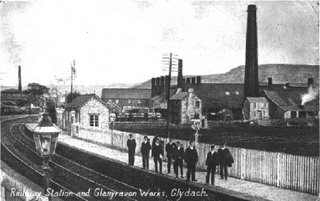D. R. Davies II: Early Religious Experience
 D. R. Davies was born in the mining town of Pontycymmer, Glamorgan, in 1889. It was, in his words, '[...] one of the smaller mining towns in Glamorgan [...].' High up in the mountains, it was surrounded on three sides, the very image of a Welsh Valleys town. Like all such towns, Pontycymmer was packed with chapels, chapels which were the centre of life.
D. R. Davies was born in the mining town of Pontycymmer, Glamorgan, in 1889. It was, in his words, '[...] one of the smaller mining towns in Glamorgan [...].' High up in the mountains, it was surrounded on three sides, the very image of a Welsh Valleys town. Like all such towns, Pontycymmer was packed with chapels, chapels which were the centre of life.It must be noted that, while both his parents were highly religious and literate, the language of D. R. Davies' boyhood was not English, but Welsh, for the South Wales valleys were far more Welsh then than they are now.
And D. R. Davies' family were no different. His father was active in the local Independent chapel, conducting the chapel's music, as well as participating in other activities:
"He attended both Sunday services, also the Sunday School and the five o'clock prayer-meeting. He never missed the Monday prayer-meeting; he conducted the Band of Hope [youth group] on Tuesday, the choir practice on Wednesday; and was present at the Gyfeillach, the testimony service, on Thursday, and on Saturday evening took part in the prayer-meeting for the Sunday services."
In addition, the elder Davies worked for John Hodge, the Labour candidate in the Gower division of Glamorgan in 1900. Although Hodge was not successful, the Labour Party won the seat six years later.
D. R. Davies' mother was a similarly religious character. D. R. Davies described her as: 'A woman of outstanding character, a magnificent Christian, to whom religion was a constant, living reality, penetrating every fibre of her being." Her preferred reading matter was theology, and when, late in life, she learned to read English, she devoured her son's theological textbooks with great pleasure. Accordingly, the Davies house was a place of prayer, with a scripture reading from Mr. Davies and fervent prayer from his wife ending the day. For the children, attendance was mandatory, and absence was punished. Writing at the end of his life, D. R. Davies expressed nothing but the most profound gratitude to his mother for forcing him to hear the words of life.
But it was not only prayer and Bible reading that D.R Davies experienced, for his mother was anxious that he should come to a personal knowledge of such precious truth:
"My mother taught me the cathechism from a little work by Dr. Thomas Charles, which exercised a profound influence in Welsh religious circles for many years. It was entitled Rhodd Mam (Mother's Gift). In the most desperate agony of my later life, it was the memory of my mother's teaching from that little book that overwhelmed me. She inculcated Christian dogma by question and answer - and no nonsense. The psychologists would say that she rammed dogma down my throat. and she did - good and hard. Its value and significance did not materialise until I was approaching fifty [...]."
After the family moved to Clydach (pictured), when D. R. Davies was eight, Davies' father was appointed choirmaster at the Independent Chapel there. D. R. Davies had to attend all the services with his father, and thus met with the people of God almost every day. But at this stage of his life, D. R. Davies had little interest in the things of God, and spent most of his time in these meetings day-dreaming.
The religion and song of D. R. Davies' early childhood was 'singing in the furnace,' however, for these godly parents were not spared their tragedies. Still, nothing kept them apart from their Saviour. For D. R. Davies, however, things were very different. As yet unsaved, he found poverty was a snare, as all things are snares to those who do not believe.
Exactly how, we shall, God willing, see next time.
Labels: D. R. Davies

0 Comments:
Post a Comment
<< Home